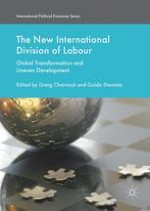2016 | OriginalPaper | Buchkapitel
5. ‘Post-neoliberalism’ in the International Division of Labour: The Divergent Cases of Ecuador and Venezuela
verfasst von : Thomas F. Purcell
Erschienen in: The New International Division of Labour
Verlag: Palgrave Macmillan UK
Aktivieren Sie unsere intelligente Suche, um passende Fachinhalte oder Patente zu finden.
Wählen Sie Textabschnitte aus um mit Künstlicher Intelligenz passenden Patente zu finden. powered by
Markieren Sie Textabschnitte, um KI-gestützt weitere passende Inhalte zu finden. powered by
